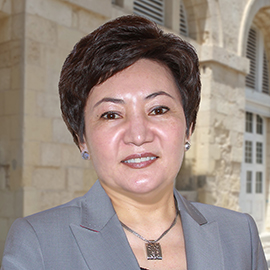Quality Assurance
PRINCIPLES OF THE ORGANIZATIONAL POLICY
- Principle of high standards for all employees and responding to the University expectations
The foundation of university policies address areas, such as code of conduct and ethics, anti-harassment and diversity which helps to create a friendly and trustful environment to fulfill employees’ responsibilities at high level.
The principle of organizational policy is aimed at accomplishing duties and responsibilities of employees in terms of behavior, actions, and processes they take in all their roles and activities; to respond effectively in accordance with the vision, mission and values the University establishes. Employees must follow University policies and guiding principles in their day-to-day routines of their jobs and explicit the University expectations at every level with high quality.
- The principles of organizational consistency
A university policy is a statement that applies broadly across the university, governing the AUM community of students, faculty, staff, partners and contractors. University policies are intended to be concise and understandable, contain a minimum amount of detail, and generally, do not require frequent change. A university policy accomplishes one or more of the following:
- Promotes the university’s mission, values, and relationships with key stakeholders.
- Contains governing principles or rules that create administrative structures, describe desired outcomes, delegate authority, assign responsibility, mandate or constrain action, and provide minimal procedures for implementation.
- Promotes compliance with laws, regulations, or other externally imposed requirements.
- Mitigates institutional risk or promotes operational efficiency.
All individuals or entities entering university real property, using university resources, or participating in university programs are subject to university standards. All university standards include an appeals process.
Clarity in the University policies and guidelines leads to everyone operating according to the established goals to a successful collaborative outcome. University procedures to its policies provide step-by-step instructions, clear processes for specific tasks and creates consistent experiences, and quality, both internally and externally regarding interactions with partners, experts, regulatory bodies, and professional institutions.
- The principle of developing employees’ performance and quality culture
Clear policies allow the University leadership to introduce and develop best practices throughout the university. Policies help build trust among employees, help to develop accountability mindset to empower both individuals and teams to be more collaborative and productive, allow them to effectively contribute to the organization’s overarching goals. Thus, fostering workplace accountability and quality culture, through the guidance of clear policies, will help to get high-performance of employees.
THE CONCEPT OF QUALITY ASSURANCE
AUM as a higher educational institution starting its second 5 year cycle is not an exception in the worldwide trend of development of its quality.
In AUM, the term review is used to describe a process that usually goes through the following stages: a university self-assessment that includes analysis of the state of teaching, research and facilities; the results of student evaluations; an external peer review; and the publication of a final report that presents results to a wider public. Reviews are predominantly used to identify areas where quality could be improved.
This approach will help to map out the present evaluation landscape in AUM, showing how the evaluation culture in this university started to develop since 2016, when the University first established in Malta. However, the Bologna process has led to marked and rapid changes in European higher education and has also served as a driving force to accelerate an awareness and use of evaluations in general to identify the quality.
Quality assurance for AUM is understood including all activities related to defining, assuring and improving the quality of the university activities. The university is aimed at continuing the development and improvement of QA processes and develop quality culture, but we also understand that a considerable time will be spent to the University community to understand them and their implications. Therefore, QA processes will help us to create platforms for horizontal and vertical communication at various levels, between departments, committees, and other bodies. This kind of effective dialogue will contribute to the development of quality culture.
While developing and improving QA the university considers course characteristics, organisational culture, historical position of the institution as well as the national context.
AUM is committed to developmental approach in our quality assurance processes. The concept of building QA includes process and system-based approaches leading to dynamic improvement of the university quality. The methodological principle of building quality system is the principle of systems dynamics and learning theories. AUM is followed by understanding that to create a successful quality, the QA Management system needs to be structured on all levels of the University.
The strategy of QA organisation is offered by MFHEA for ongoing monitoring and review of programmes, which is considered as a logical guidance for educational institutions of Malta to assure quality. MFHEA indicates that one of the principles of both Internal and External quality assurance for improvement of learning outcomes is based on Quality Cycle, consisting of implementation, evaluation, review, and planning processes (www.mfhea.mt Internal Quality Assurance)
AUM implements the Quality Cycle by monitoring and periodically reviewing educational programmes in terms of the IQA policy and standards.
AUM is expanding QA guidelines and reviewing procedures we should have in place to address deficiencies, developing measurements we can make to show that standards and requirements are achieved, improving setting up a coherent Internal QA system.
Internal QA system helps us to integrate strategic planning with operational management, to evaluate the effectiveness of strategic planning and operational management processes, to have procedures agreed and operate successfully. It will also help to have the staff engaged in quality assurance, establish effectiveness of QA review and how the QA system be measured.
University External evaluation practices encourage the university to analyse in which way the university should improve its QA systems and processes to achieve an effective progress in its development.
QA Policies and Procedures
Contact Quality Assurance Office

Dr. Gulnara Sarsenbayeva
Quality Assurance Manager
If you have any questions with regards to the Quality Assurance Office, kindly contact the QA Manager